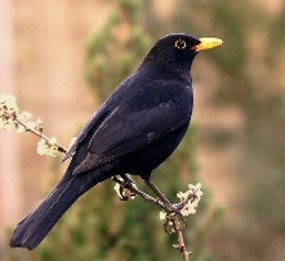Usually, The fourth day of Christmas according to the seasonal refrain. is the day ‘my true love sent four calling birds’ , which could refer to many species of bird. But the original version has the line ‘ four colly birds. This is rarely sung these days as it does not appear to make sense. ‘Colly’ is an archaic term from the West Country which meant the colour black, deriving from the word ‘coaly’ or coal coloured. Sometimes spelt ‘collie’ (with white) referring to the dog of the same name. So a ‘colly bird’ simply means a black bird.
One of the most common and popular birds in our churchyard and gardens is the blackbird. It is loved, not only for its pure, intense black colour, but for its melodious voice, written and sung about for centuries from Shakespeare (Midsummers Night’s Dream), the poet John Clare to Paul McCartney (White Album). By contrast other visiting black birds, rooks, crows and their relatives the magpies usually have negative associations often mysterious, dark and sometimes evil. So the blackbird is the black- bird inspiring affection with his orange bill and the yellow rings around his eyes giving an open, friendly appearance and is welcomed into our gardens. But the main thing that propels it up the popularity charts is its wonderful song. In the spring it leads the dawn chorus in garden, churchyard and woodland usually before daybreak. Perhaps the main reason however is the blackbirds ability set up home and live with us in preference to the woodland. Studies have shown that blackbirds breed at higher densities in suburban areas. Mainly because they take advantage of the free and available food we provide all year round and have no need to travel away from the nest site in winter. Its habits too are mainly benevolent spending most time hopping around our lawns or in the leaf litter of the churchyard searching for earthworms and other invertebrate prey. If you watch a male blackbird feeding, he seems to glance at you from time to time. In fact he is tilting his head from side to side to listen for the tiny movements of worms just beneath the surface of the ground, so in urban areas he has now adapted and thrives and according to the annual RSPB Garden Birdwatch results, blackbird numbers are increasing.

For me the puzzling recognition of the blackbird singing remains in the traditional nursery rhyme “Sing a Song of Sixpence”. where four and twenty were baked in a pie and began to sing ‘when the pie was opened’.
BM Dec ’22
You must be logged in to post a comment.